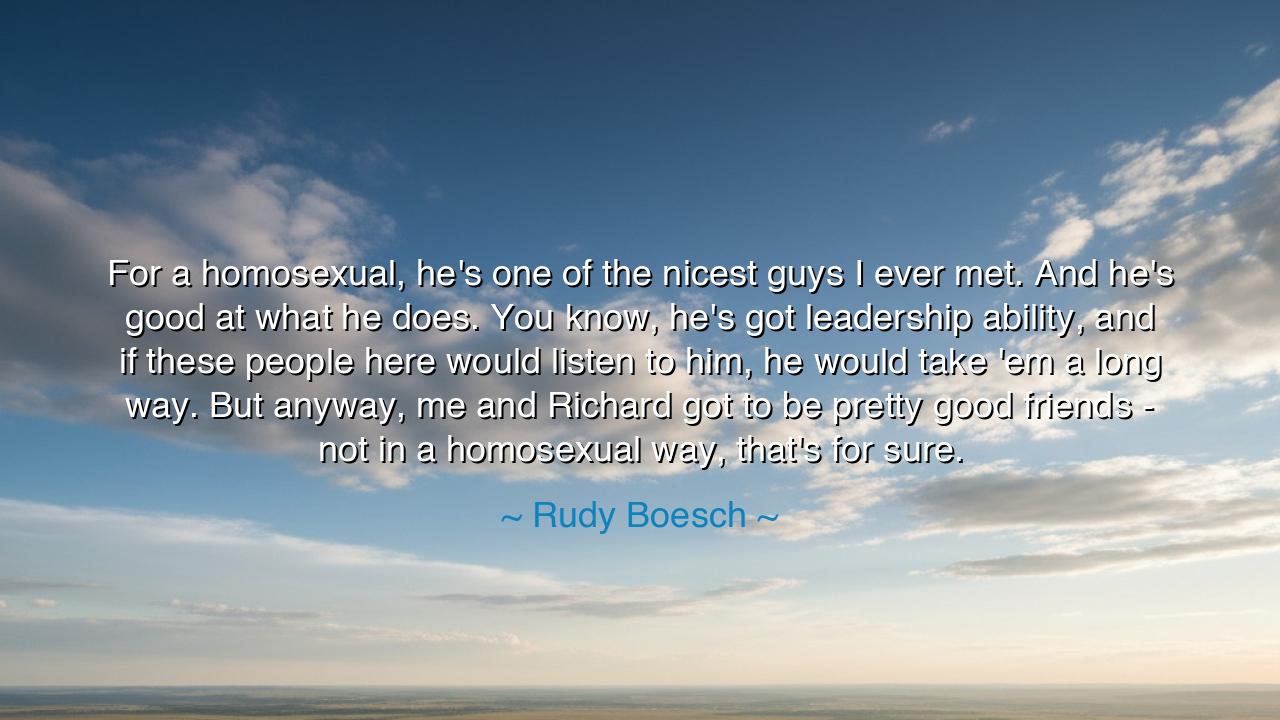
For a homosexual, he's one of the nicest guys I ever met. And
For a homosexual, he's one of the nicest guys I ever met. And he's good at what he does. You know, he's got leadership ability, and if these people here would listen to him, he would take 'em a long way. But anyway, me and Richard got to be pretty good friends - not in a homosexual way, that's for sure.






Hear, O listeners, the surprising words of Rudy Boesch, a man of the sea and a warrior of service, who once spoke of his companion Richard: “For a homosexual, he’s one of the nicest guys I ever met. And he’s good at what he does. You know, he’s got leadership ability, and if these people here would listen to him, he would take ’em a long way. But anyway, me and Richard got to be pretty good friends—not in a homosexual way, that’s for sure.” These words, though clothed in the roughness of their time, hold within them a seed of transformation, a sign of how friendship and respect can break through walls of prejudice.
What is revealed here is not polished rhetoric, but the raw honesty of a man confronting the unfamiliar. Rudy, a veteran of another age, came from a world where difference was often feared or scorned. Yet through the fire of shared struggle, through the proving ground of character, he found that labels and judgments grew small before the weight of truth. He discovered that friendship could bloom even where society had sown division, and that respect could overcome the barriers of bias. This is the first power of his words: they show us that even hardened hearts may soften when faced with the undeniable dignity of another soul.
In praising Richard’s leadership, Rudy touches a universal truth: that greatness is not bound by race, creed, or love. Leadership is the ability to guide others, to inspire, to bring out the strength within a group. Though Rudy begins with a clumsy acknowledgment of Richard’s identity, he cannot help but recognize the deeper truth—that ability, courage, and wisdom are not diminished by difference. And so he admits, perhaps reluctantly, that if the people would but listen, Richard could carry them far. Here, we see the moment when prejudice yields to reality, and the light of respect shines through.
Consider the many tales of history where enemies became brothers, and the walls of division crumbled through shared struggle. Recall the story of Frederick Douglass meeting Abraham Lincoln. Douglass, a former slave, entered the halls of power, uncertain of the welcome he would receive. Yet Lincoln greeted him not as a curiosity but as an equal, asking his counsel, respecting his mind. In that moment, the boundaries of race bent before the higher truth of shared humanity. So too, in Rudy’s rugged words, do we see the beginning of such a crossing—from suspicion to respect, from otherness to friendship.
The lesson here is that friendship and respect are the great dissolvers of prejudice. When men and women work together, when they strive shoulder to shoulder toward a common goal, the differences that once seemed mountains become pebbles. Rudy’s words are not free of the ignorance of his time, yet they reveal a heart changing in real time, discovering that worth is not bound by labels, but by character and deed.
And what of his insistence—“not in a homosexual way”? This too reveals the struggle of his age, the lingering discomfort with difference. Yet even here there is value, for it shows that transformation is often imperfect, often halting, but real nonetheless. Growth is not the sudden shattering of chains, but the slow loosening of links. Rudy was not a prophet of equality, but in his blunt honesty he gave voice to a step forward, a crack in the wall, through which light might enter.
The teaching, O seekers, is this: do not dismiss the rough beginnings of understanding, for even imperfect words may mark the path to wisdom. When you encounter difference, let not prejudice blind you to ability, character, or truth. Instead, walk with openness, for friendship may arise where you least expect it, and respect may grow even in unlikely soil. Let the example of Rudy remind you that growth is possible, even for those raised in the hardest traditions, if they are willing to look at the heart of another human being.
Therefore, in your own life, practice this: work beside those who are different, listen to their voices, and see their worth. Do not let old habits of thought blind you to new truths. Like Rudy, you may find yourself surprised by friendship, and like him, you may learn that leadership, courage, and kindness transcend every boundary. For in the end, all are united not by labels, but by the simple, unyielding truth of our shared humanity.






AAdministratorAdministrator
Welcome, honored guests. Please leave a comment, we will respond soon